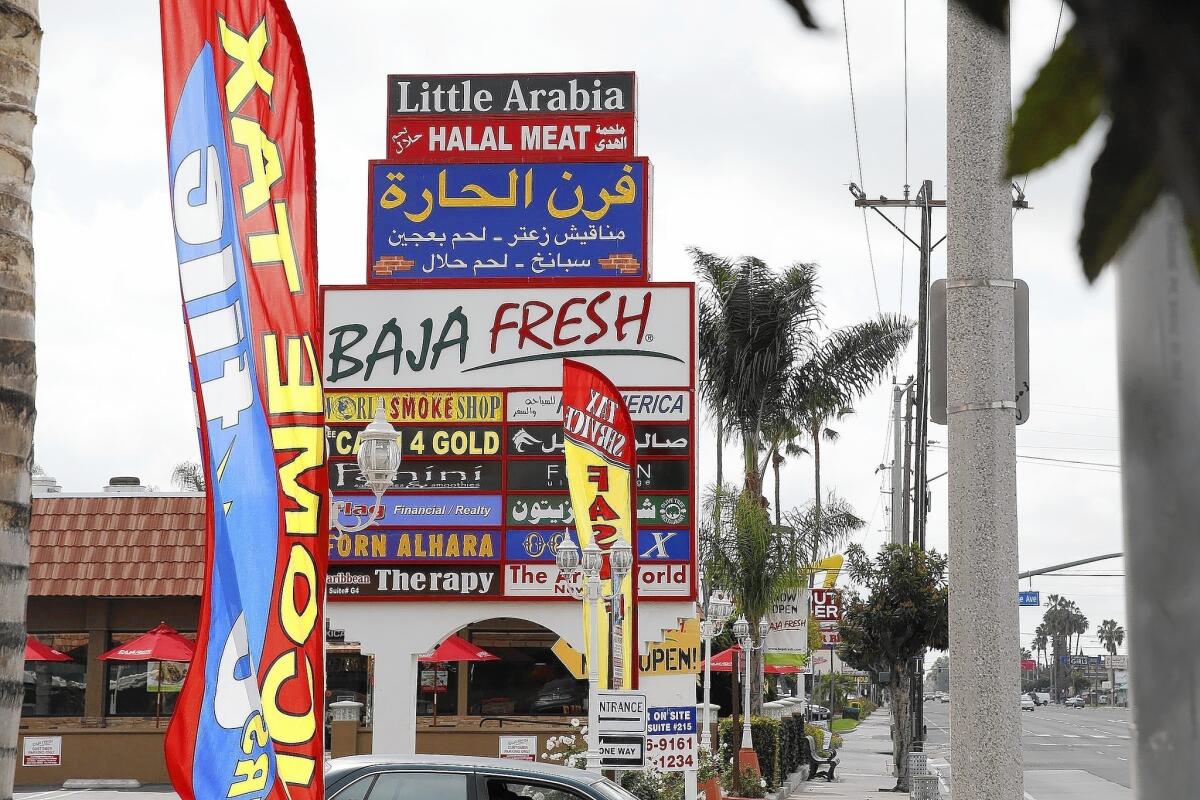Anaheim’s Little Arabia pushing for a higher profile

Two miles from Disneyland, a stretch of strip malls in Anaheim has transformed into an enclave catering to California’s Arab American community.
It lacks the immense sprawl of nearby Little Saigon or the decades-long history of Chinatown in Los Angeles, but the place now known as Little Arabia is a destination for Arab Americans from around the state and, lately, a go-to place for foodies in search of Middle Eastern dishes.
Yet Little Arabia is largely unknown to the millions of tourists who flood into Anaheim every year — and it remains below the radar even to longtime residents in the city’s west side.
A group of ambitious activists and business owners is trying to change that by getting city and tourism officials to recognize the commercial district as a destination.
“The most important thing to us is saying, ‘We are part of Anaheim,’” said Rida Hamida, director and co-founder of the Arab American Civic Council. “You have Disney, the Honda Center, the Angels, and you also have Little Arabia.”
The push is starting to gain some momentum. Most recently, the Anaheim/Orange County Visitor & Convention Bureau agreed to put Little Arabia on its visitors guide.
“What I’ve seen of it, it has some great restaurants that I got to enjoy and a community that’s trying to build something there, so that’s exciting to see,” said Jay Burress, president and chief executive of the convention bureau, who visited Little Arabia for the first time last month.
The civic council is also preparing a new website and brochure to attract visitors.
Proponents’ most ambitious goal — an official designation for Little Arabia and an accompanying freeway sign — is a long-term one. But it’s getting push-back from some nearby residents and even some within Little Arabia.
Some residents say such a designation would shortchange other ethnic pockets in the county’s largest city. They have also complained about the increase in hookah lounges that have opened in Little Arabia.
To some Little Arabia denizens, there’s a sense that the enclave is just not ready for a coming-out party.
Generally seen as the dense commercial strip along Brookhurst Street between Crescent and Katella avenues, Little Arabia holds a wide variety of storefronts. There are restaurants, grocery stores, hookah bars and clothing shops, each catering to the region’s large Arab American population, all intermixed with a slew of chain groceries, fast-food places, Mexican diners and muffler shops.
“We’re not ready to do a grand opening yet for Little Arabia because it’s not ready,” said Ahmad Alam, owner of Arab World Newspaper and a local property owner who envisions malls, movie theaters, “something to hang on to.”
Alam said Little Arabia lacks cohesion and has fallen short of the place he imagined: an ethnic community that would “make everything available for the new generation, to know about their history and heritage.” The area, he said, is not yet suitable for an official designation.
When supporters of the effort to gain recognition came to him, he said, “I told them, ‘Hey, good job. Bring me investors.’”
Esther Wallace, chairwoman of the West Anaheim Neighborhood Development Council, said she’s opposed to focusing attention on Little Arabia with an official designation.
“There’s only one ethnic group that’s being promoted and that’s the Arab American group,” Wallace said. “We don’t have a Little Mexico or a Little Korea. All the pressure seems to be on putting a Little Arabia out here, and I don’t see why.”
None of that has dissuaded those who want the city and tourism officials to pay attention to the area.
Getting the area into visitor guides is just a first step, said Rashad Al-Dabbagh, also of the Arab American Civic Council. Next, the group would like to see a tourist bus from the Anaheim Convention Center to Little Arabia. Like Alam, it would also like to see the look of Little Arabia become more cohesive, a look Hamida described as an Andalusian style.
But without lots of money to invest, Al-Dabbagh, Hamida and other supporters are taking a different tack: using social media to draw attention to the area, trying to bring city officials into the fold and inviting residents to learn about the community.
Recently, they held an event dubbed the “shawarma summit,” a meeting of business owners and local leaders, including Wallace, Burress and Mayor Tom Tait. It took place at Papa Hassan’s Grill, a restaurant specializing in Lebanese shawarma.
Tait said he supports efforts to draw more attention to Little Arabia but not an official designation.
“It’s this great local flavor that we should be bragging about,” he said. However, “as far as the city saying here’s where the lines are, I’m not for that, because if we do that officially that could exclude people who aren’t a part of it.”
Organizers of the effort are prepared to be patient.
“Some are reluctant, but it takes some educating about what is the vision,” said Asem Abusir, who last year opened Knafeh Cafe, which specializes in a generations-old pastry recipe from Nablus in the West Bank. “It’s going to take some education both internally and externally.”
More to Read
Sign up for Essential California
The most important California stories and recommendations in your inbox every morning.
You may occasionally receive promotional content from the Los Angeles Times.











